Friday, 29 August 2008
Apologies... not faith, the sorry kind.
Saturday, 9 August 2008
From Holy Smoke
(Stolen from Holy Smoke)

The New Mass being celebrated at St John the Evangelist
One hundred parishioners of St John the Evangelist, Allerton Bywater, have petitioned their bishop, the Rt Rev Arthur Roche, to allow the parish to celebrate Mass only in Latin, in both the old and new forms. Instead, he is closing the church this month and has told the parish priest, Fr Mark Lawler, that he will not be appointed to a new parish because his ministry is "divisive".
Fr Lawler told me today: "This is a parish that does exactly what the Holy Father tells us to do, celebrating the Mass reverently in the old and new forms. The bishop is determined to squash it, and to destroy me because he doesn't want me moving to another parish and doing the same thing."
The parish pastoral council has written to Bishop Roche asking why he has ignored its two formal petitions for the status of a "personal parish" celebrating Mass only in Latin, in accordance with Article 10 of Summorum Pontificum, Pope Benedict's apostolic letter liberating the traditional Latin Mass.
It has now retained the services of a leading canon lawyer to challenge Bishop Roche's decision to close the parish as part of a wider programme of closures.
Relations between Bishop Roche and Fr Lawler have been strained for years. The bishop told Fr Lawler some time ago that he wanted him to say Mass facing the people, and that because he had told him what to do it was therefore the will of the Holy Spirit.
Pope Benedict, in contrast, has written at length defending the ancient practice of celebrating the Eucharist facing east. He has also given priests the legal right to celebrate a public Mass in the traditional rite if they are approached by a stable group of the faithful, however small. At St John's, the vast majority of regular worshippers have asked for the old rite to be made available. On August 17, their church will be closed by the diocese.
Fr Lawler says he asked for a meeting with Bishop Roche, but to no avail. Instead, the Vicar General, one Mgr McQuinn, has written to him, telling him: "The Bishop ... believes your ministry to be divisive, is uncertain that ordinary pastoral care of parishioners is taking place and does not have confidence that you will celebrate the Ordinary Form of the Mass with a generous heart for the vast majority of parishioners who expect Sunday and weekday Masses to be in English and at an altar facing the people."
In an open letter to his parishioners, Fr Lawler describes this claim as "a slur on my character, an attack upon my priesthood and totally without foundation."
Clearly, this matter must now go to Rome. Perhaps the pontifical commission Ecclesia Dei might be persuaded to take a closer look at the scandal unfolding in Allerton Bywater.
Early Warning Time
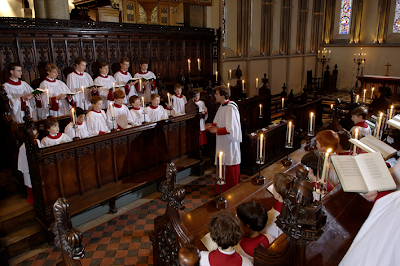
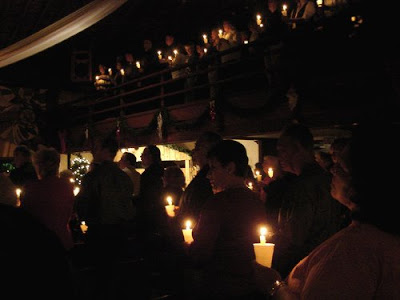
Now a word for priests, MCs, liturgy committees, and anyone else interested.
Christmas liturgy should be unashamedly theatrical. Candlelight is a must for a dramatic Midnight Mass. A young child singing a soprano solo will eliminate any Grinch-like tendencies amongst Scrooge-ist parishioners. Perhaps more importantly, the involvement of a school or youth choir will bring in parents and relatives, giving the Church a chance to speak to those who mightn't usually turn up on the average Sunday morning.

So this is just a friendly reminder. Christmas is something that sticks in people's minds. Perhaps, years from now, a fallen away Christian will remember Father Whatsisname's Midnight Mass '08, the way the choir sang, the deep music of a pipe organ, an eloquent homily... it will all come flooding back, and the spiritual life of such a person will re-awaken.
Don't waste Christmas.
Plan ahead!
Friday, 8 August 2008
More Prayers
Prayers for Peace
 It is with horror and uncertainty that the world's media reports today that Russia and Georgia are on the brink of all out war. Georgian aircraft have bombed and strafed targets in the breakaway region of South Ossetia. In the early hours, Russian tanks crossed the border, a de facto invasion of Georgia in support of Ossetian people.
It is with horror and uncertainty that the world's media reports today that Russia and Georgia are on the brink of all out war. Georgian aircraft have bombed and strafed targets in the breakaway region of South Ossetia. In the early hours, Russian tanks crossed the border, a de facto invasion of Georgia in support of Ossetian people.Georgia's pro-Western government believes Russia has been fuelling the separatist conflict in South Ossetia and the country's other breakaway region, Abkhazia, as part of its attempts to stop Georgia joining Nato.
Russia seems to be accusing Georgia of ethnic cleansing in Ossetian villages.
Please keep this volatile region in your prayers.
Requiem Aeternam
Say a prayer for this soldier, who I shall not name, and pray for all our troops in Afghanistan.
Greater love than this no man hath, that a man lay down his life for his friends.
Tuesday, 5 August 2008
Kyrie Eleison
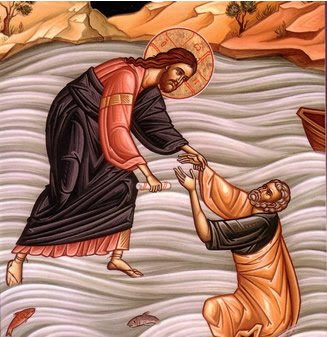
Lord have mercy. The more I appreciate and comprehend the true beauty and love of the forgiveness that Our Father sends through His Anointed, so much more clearly can I see my own sinfulness, and the tragic effect of rebellion against the Almighty in day-to-day life.
"Depart from me, for I am a sinful man, O Lord."
The real danger is that, discovering the fullness of our rich Faith through study, I begin to develop a merely academic relationship with God. Faith turns into knowledge when we forget that Christ, the Way and the Truth, is not only the messenger but is himself the very message itself.
"Woe unto you, scribes and Pharisees, hypocrites! for ye are like unto whited sepulchres, which indeed appear beautiful outward, but are within full of dead men's bones, and of all uncleanness."
This loss of the spiritual and intimate side of the Christ life awakens in me the worst temptation. In the Gospels, Jesus reserves special scorn and vitriol for the hypocrites, the Pharisees and the scribes. The temptation is that, being knowledgeable of heresy and sin, I am all too often tempted to whitewash over my own transgressions and iniquities in order to come across as my own perception of a "good Christian".
"And the publican, standing afar off, would not so much as lift up his eyes towards heaven; but struck his breast, saying: O god, be merciful to me a sinner."
So I acknowledge my sin. Please, dear reader, don't be fooled by my whitewashed sephulcre. As I am sure you know "all have sinned". I am currently trying to reinvigorate my diminishing prayer life. I think I will try to avoid the pretentiousness of the Divine Office for a little while; that might only inflate my already swollen ego. I have found great comfort in the "Jesus prayer", which I would recommend to anyone; the echo of the publican's prayer is both mournful and hopeful, and the Holy Name reminds me that we have hope in Christ.
"For neither doth the Father judge any man, but hath given all judgment to the Son."
The rather magnificent icon just above is a symbol of both fear and hope for sinners such as we. We are afraid, because we know that the Perfect One will judge us against His most exacting standards of Faith and Love, and because we know that some will be burned as darnel in the furnace. On the other hand, it is a symbol of hope, because we will be judged by the one who is our brother in Baptism and Faith. Jesus the Anointed is the Gospel, with the love of a brother and the infinite wisdom of the Omniscient He shall judge us, and we may be saved by that Gospel. The symbols of the Evangelists remind us of this.
"Thy faith hath saved thee; go in peace."
So I will have faith in Him, pray for His mercy, and trust the one who is Message and Messenger.
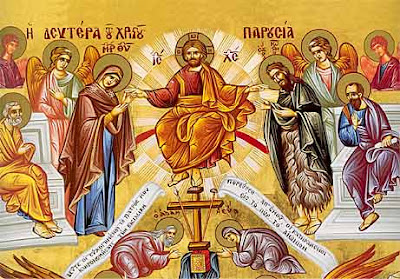 Kyrie Eleison,
Kyrie Eleison,Christe Eleison,
Kyrie Eleison.
Icon Insight
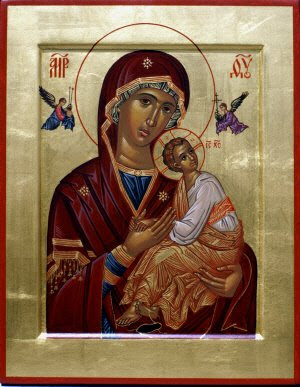
Saturday, 2 August 2008
Spe Salvi
Friday, 1 August 2008
S. Alphonsus
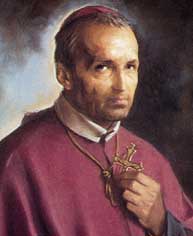
From Wikipedia:
Saint Alphonsus Liguori was born in Marianella, in the Kingdom of Naples. He was the first born of seven belonging to the Neapolitan nobility. Two days after he was born he was baptized at the Church of Our Lady the Virgin as Alphonsus Mary Antony John Cosmas Damian Michael Gaspard de' Liguori[1]. Liguori went to law school at age sixteen, becoming a very well-known lawyer. He was thinking of leaving the profession, (He wrote to someone, “My friend, our profession is too full of difficulties and dangers; we lead an unhappy life and run risk of dying an unhappy death. For myself, I will quit this career, which does not suit me; for I wish to secure the salvation of my soul.”) [2] when at age 27, after having lost an important case, he made up resolution to leave the profession of lawyer.
In 1723, after a long process of discernment, he abandoned his legal career and, despite his father's strong opposition (and reluctant consent), began his seminary studies in preparation for the priesthood in the Oratory of St. Philip Neri. He was ordained a priest on 21 December 1726, at the age of 30. He lived his first years as a priest with the homeless and marginalized youth of Naples. He founded the "Evening Chapels". Run by the young people themselves, these chapels were centers of prayer, community, the Word of God, social activities and education. At the time of his death, there were 72 of these chapels with over 10,000 active participants. His sermons were very effective at converting sinners.
In 1729 Alphonsus left his family home and took up residence in the Chinese College in Naples. It was there that he began his missionary experience in the interior regions of the Kingdom of Naples where he found people who were much poorer and more abandoned than any of the street children in Naples.
On 9 November 1732 Alphonsus founded the Congregation of the Most Holy Redeemer, when a nun named Sister Maria Celeste Castarosa (whose body would later be found incorrupt) told him that it had been revealed to her that he was the one God had chosen to found the Congregation. This order's goal was to teach and preach in the slums of cities and other poor places. They also fought Jansenism which was a heresy that denied humans free will and barred many Catholics from receiving the Eucharist. He gave himself entirely to this new mission. A companion order of nuns was founded simultaneously by Sister Maria Celeste.
Alphonsus was consecrated Bishop of the diocese of Sant'Agata dei Goti in 1762. He tried to refuse the appointment because he felt too old and too sick to properly care for the diocese. During this time he wrote sermons, books, and articles to encourage devotion to the Blessed Sacrament and the Blessed Virgin Mary. In 1775 he was allowed to retire from his office and went to live in the Redemptorist community in Pagani, Italy where he died on August 1, 1787. He was canonized on May 26, 1839, by Pope Gregory XVI, proclaimed a Doctor of the Church in the year 1871 by Pope Pius IX. He was named "Patron of Confessors and Moralists" by Pope Pius XII in the year 1950, who wrote an encyclical "Haurietis Aquas" regarding St. Alphonsus.
















